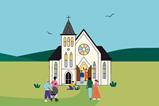
In the year I was born, Bob Geldof and Midge Ure got their pop star friends together, including U2’s Bono, Sting, Duran Duran and Spandau Ballet, to create a song to help raise money for those affected by the famine in Ethiopia. Their efforts are of course to be applauded, but the problem is that no song in popular culture in my lifetime has done more to propagate a problematic picture of Africa than Band Aid’s ‘Do They Know It’s Christmas?’
I’ll admit it, the song used to be one of my Christmas favourites. Its catchiness masks its deeply warped view of what Africa is actually like. I remember when the penny dropped, and I stopped singing it. I realised that the ‘Africa’ sung about by these 1980s pop stars bore little resemblance to the continent I knew.
"And there won't be snow in Africa this Christmas time
The greatest gift they'll get this year is life (Ooh)
Where nothing ever grows, no rain or rivers flow
Do they know it's Christmas time at all?"
They had got one thing right: snow was unlikely, but my family back home in Nigeria were full of life. When I think about nothing growing, nor rain falling, my mind harks back to the images of lush greenness I have seen as the plane makes its descent into Port Harcourt. I remember the times of being caught in the heavy downpours during the rainy season. None of these are the first things that come to mind when most British people think of Africa. The narrative is of the desolate place described in the Band Aid single.
As Mark Curtis, director of the World Development Movement, said when the song was re-released for a new generation in 2004: “It conjures up an image of a continent inhabited entirely by starving children with flies on their faces sitting in the sun-baked bed of a dried up stream.” This is not to deny that many countries in Africa do experience drought and famine and are facing the full effects of climate change as a present reality. What is missing, however, is room for both the luscious greens and the parched landscapes to exist.
The irony of the question ‘Do they know it’s Christmas?’being posed in a charity single to help during the Ethiopian famine is that Christianity, the reason for Christmas, existed in Ethiopia centuries before Europeans arrived, Bibles in hand. Two thirds of modern-day Ethiopians are Christian, with the majority of those belonging to the Ethiopian Orthodox Church – one of the oldest organised Christian groups in the world. They know it’s Christmas.
Being an African and a British charity fundraiser is sometimes a strange place to be. My day job is to help find ways to tell stories that help members of the public see the desperate need that exists for people in some of the poorest and most marginalised communities around the world. But all my life I have struggled with what author Chimamanda Ngozi Adichie calls this “single story” perpetuated about Africa.
The international development sector has some part to play in having, for decades, presented a single story of people from African nations. That’s why I’m so glad that Comic Relief has announced it will no longer send celebrities to Africa and are choosing to reimagine their use of imagery and video, using work from African film-makers to tell their own stories of the need that they see through their own eyes.
We who work within development have been having conversations for years, challenging ourselves to do better when it comes to our depictions of the communities we work with, thinking differently about the language we use in our fundraising appeals.
At Christian Aid, our imagery aims to present people with dignity, and we are extremely thankful for the generosity of our churches and supporters who give to our work – especially during the Covid-19 pandemic.
As a charity fundraiser, I want us to tell stories that draw on our shared humanity, not our difference, that elicit not just pity in the prospective donor, but an empathy that comes from knowing that these are people made in the image of God just like us. We are not superior. We are not the saviour. We join in solidarity with our brothers and sisters around the world and rage at the injustice that sees them caught up by broken economic systems, conflict and humanitarian disaster.
I think we need to give the British public far more credit; they are able to understand stories with more texture, complexity and nuance and still be compelled to give. We don’t have to choose lazy tropes and stereotypes that put forward simple and binary stories.
As Adichie said in her TED talk The Danger of a Single Story: “The problem with stereotypes is not that they are untrue, but that they are incomplete. They make one story become the only story.”
































